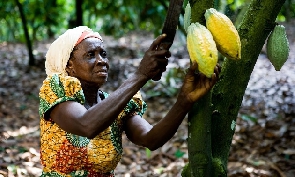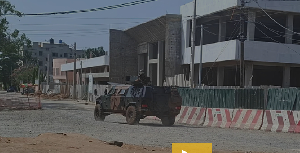Despite Ghana’s dominance in cocoa production in the world, the country still heavily relies on rain-fed agriculture. However, with the changing and unpredictable weather pattern which has been attributed to climate change, it means a viable alternative must be aggressively adopted.
Naturally, irrigation is the go-to alternative, but that too has been made almost impossible due to the negative effects of illegal small-scale mining, which is predominantly done along the river bodies in Ghana.
“Unfortunately, we rely on rainfed agriculture as a country. At present COCOBOD is piloting, in fact, we have done the pilot to a stage where we are supposed to roll out full irrigation.
"The cost involved regarding those we have tried is a little bit on the higher side so there is the need to find one that the farmers will be convinced that indeed it serves a purpose. It is about the mathematics, you need to do the cost-benefit analysis so yes, the effects of climate change are telling on our industry,” Fiifi Boafo said.
Fiifi Boafo works with the regulator of Ghana’s cocoa industry, the Cocoa Board, as the Head of Corporate Affairs. He has sounded the alarm bells regarding the ravaging and potential negative effects of climate change on the industry.
He added that urgent steps from all relevant stakeholders must be taken to avoid a looming crisis that no one seems to be paying attention to.
Speaking to GhanaWeb as part of a special climate change project in collaboration with the Centre for Journalism Innovation and Development, Fiifi Boafo said the outlook does not look great if immediate steps are not taken.
“Huge, very huge. The impact of climate change on our industry. If you look at our production trends it has changed. In fact, now our research wing is developing a manual on how we do our farmer education and sensitization.
“Over the years, we know within that period to this period is when we have the rainfall and we have our harmattan at a certain period. But these days you even have the rainfall in December. And June/July when we used to have rainfall, we now have a dry spell. Even when you are supposed to apply the fertilizers; because if you apply the granular fertilizers, you need rainfall for them to melt to get into the soil to get production you can’t do it because the pattern has changed. Your expectation is that you get rainfall within the period, you apply it and there is no rainfall and it is affecting production. So, its effect (climate change) is huge.
“Meanwhile, you have spent money, prepared, you have done your pruning, you have sprayed your chemicals that is supposed to help with flowering and all but because all these do not meet the rainfall due to climate change, it affects your production.
“For someone who is just criticizing they will say because you have not invested in the industry that is why we are not having results, but the point is it didn’t meet the rainy season as we know it for which reason you have lost out.
“And that is just to give you an idea of the impact of climate change on our industry.” Fiifi lamented.
Cocoa is Ghana's most important cash crop and a significant contributor to the country's economy, providing employment for over 800,000 people, many of whom are small-scale farmers.
But the impact of climate change, smuggling and other factors, notably illegal small-scale mining has become a threat to Ghana’s cocoa sector.
According to some experts, Ghana will likely lose its enviable position as the second-largest producer of cocoa in the world unless drastic measures are taken.
Polluted water bodies affecting irrigation plans for cocoa farmers
Further, Fiifi Boafo said that the cutting of trees and the activities of illegal mining, which is done in most of the forest reserves in the country, destroy the land and pollutes the rivers and other water bodies.
“One problem which we have identified which is a major problem when it comes to irrigation is the galamsey where the river bodies which we are supposed to use for irrigation are hugely polluted so you are unable to use it. And it is even adding to the cost of the irrigation system we are trying to introduce because you now have to use boreholes, so sinking the boreholes and all that and sometimes the water quality and levels are not enough to do what you want to do. So, it adds to our cost.”
Time to protect our environment
Asked if this is the new reality of the Ghana cocoa sector, Fiifi Boafo said, “No, we need to protect our environment, it is critical. It is critical to protect our environment because if you look at the geography of our country, cocoa production is within our forest zones and it is because the forest zones are where the rainfall is better. But, in a situation where we are cutting our forests and doing illegal mining, definitely it will have an effect on our production as a country.”
Ghana has had a fluctuating production of cocoa for the last couple of years. From 2016-2017 there was a decline in the per metric tonne production from 969,000 to 766,977 in 2019/2020. Thankfully, the production increased, hitting the 1 million metric tonne mark during the 2020/2021 production period.
Analysts fear if behaviours, such as illegal mining, which result in the felling of trees and pollution of water bodies are unchecked, cocoa production figures will shrink in the near future.
What Is Climate Change?
According to the United Nations, Climate change refers to long-term shifts in temperatures and weather patterns. Such shifts can be natural, due to changes in the sun’s activity or large volcanic eruptions. But since the 1800s, human activities have been the main driver of climate change, primarily due to the burning of fossil fuels like coal, oil and gas.
How climate change affects our lives
Climate change can affect our health, ability to grow food, housing, safety and work. Some of us are already more vulnerable to climate impacts, such as people living in small island nations and other developing countries. Conditions like sea-level rise and saltwater intrusion have advanced to the point where whole communities have had to relocate, and protracted droughts are putting people at risk of famine. In the future, the number of “climate refugees” is expected to rise.
This report was completed as part of the Centre for Journalism Innovation and Development‘s 2023 Climate Change Fellowship with funding support from the Centre for Investigative Journalism’s Climate Change in News Media project.
General News of Monday, 15 May 2023
Source: www.ghanaweb.com













